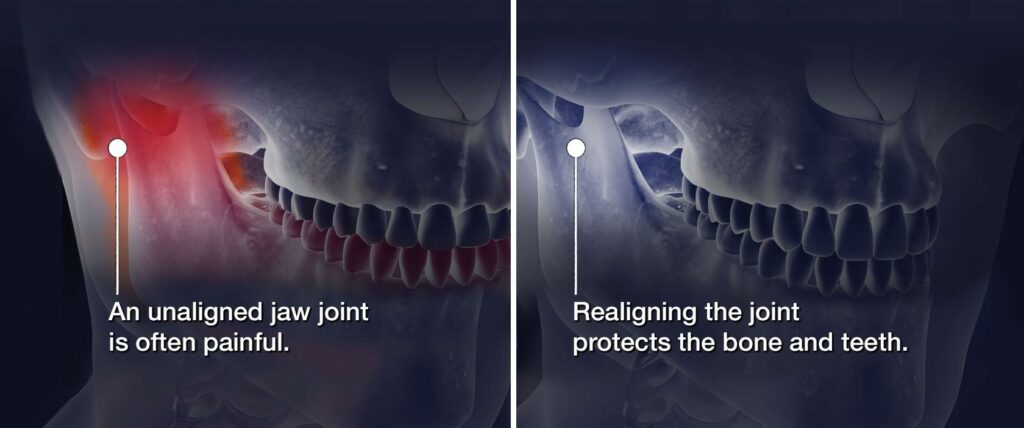TMJ Treatment
New Patient Experience
Only $109 – Includes all necessary X-rays and Dr. examination
Second Opinion
Considering a major dental procedure and want a second opinion? Request a complementary consultation today ($195 value).
Why TMJ Treatement
An imbalanced bite can trigger a range of problems as the jaw joints overcompensate in order to achieve a balanced resting position.
TMJ disorder treatment by a dentist can achieve the balance needed to stop inflammation, facial pain, headaches, and other symptoms.
Relief
Treatment can eradicate symptoms such as pain in and around the joint, clicking when opening and closing your mouth, a locked jaw, and headaches.
Long-Term Benefits
By realigning the jaw, your dentist can prevent long-term harm, such as worn teeth, increased vulnerability to tooth decay, and serious joint damage.
A Better Quality of Life
In the long run, TMJ treatment can improve your quality of life by relieving persistent and often debilitating symptoms that can compromise your mood and general wellbeing.
Greater Affordability
In the long run, early TMJ treatment reduces the need for repeated and expensive procedures later in life.

*According to the Cells Tissues Organs
TMJ Treatment is Recommended If
Are Still in Pain
You should contact a doctor if your symptoms do not resolve on their own.
Can’t Open Jaw Fully
If you have trouble chewing or speaking properly, you probably need treatment.
Are in Good Health
You need to be in good health to undergo surgery (for more severe cases).
Unlike a toothache, the symptoms of TMJ disorder are often easy to dismiss as stress. In fact, stress is sometimes a major contributing factor. However, because pain and other symptoms are not always persistent, it might be tempting to delay making an appointment even if you think you are experiencing TMJ disorder. However, the longer you wait, the more damage the condition can cause. As with any health issue, the sooner it is addressed, the better.

A Simple Process To Assess If TMJ Treatment Is Needed
- Evaluate Your Condition
During the initial consultation, your doctor will evaluate your case by asking about your symptoms, reviewing your medical history, and examining your bite. - Take X-Rays
Often, the examination will involve x-rays that will allow your dentist to analyze the way in which your jaws and teeth meet. A cone beam scanner may also be used to analyze the jaw joints. - Recommend Treatment
If your dentist determines that malocclusion or other conditions are placing stress on the jaw joints, they can recommend a number of treatment options. In some cases, it may be necessary to refer you to a specialist.
TMJ Disorder Can Be Relieved Through
Custom Mouthguards
Custom mouthguards can prevent you from damaging your teeth while grinding during sleep.
Orthodontics
Orthodontics can align the jaws and allow the teeth to meet properly.
Prosthodontics
Prosthodontics such as dental crowns can restore a balanced bite.
Reshaping Teeth
Reshaping certain teeth can achieve better balance and relieve tension in the TMJs.
BOTOX® Medical
BOTOX Medical injections can relax strained jaw muscles.
Medications
Your doctor may recommend pain relievers or anti-inflammatories to ease discomfort, low doses of antidepressants to control bruxism, or muscle relaxants to reduce spasms.
Surgery
In serious cases and only as a last resort, surgery can repair the joints.
Untreated TMJ disorder is often uncomfortable at best and debilitating at worst. In many cases, it is also accompanied by a slew of distracting or unpleasant side effects. By realigning your jaw, a doctor can reduce or even eliminate these symptoms. Not only will you ease discomfort in your daily life, but you also won’t have to be overly careful when yawning or eating.